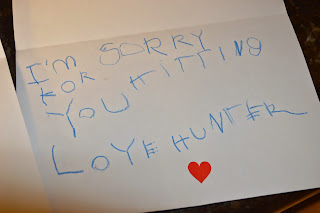"Recovery"
"Recovery." Haha! You parents are crazy.
Hate to admit it, but that ran through my head in my early days as a professional in this field. I remember a set of sweet parents, new to the states, who had asked in a planning meeting for their son's special education program, "How long will this Autism thing last?"
Forever.
That is, if you let it beat you.
I hadn't added a co-name to our blog when I started writing. As I became more comfortable with my openness and willingness to share our story, I added, "The Story of the Recovery of our Son." In all honesty, recovery is the main plan of action.
If you injure yourself, you attend PT. You recoup the skills that were lost, in the means of exercises, stretches, and stimulation. We are working to recoup the skills that Hunter lost. A neurotypical child who changed at 17 months, who was previously ahead of his peers. After the tic and the sensory issues began to develop, we did see regression in several areas. The hours of therapy and planning, diet and modulation, and stimulation and exercise are all in the attempt of recovery.
I'm sure some of you have either read or heard of Jenny McCarthy's books. They are controversial and most Autism professionals scoff at her writing. Prior to being a parent of a child with an ASD, I may have done the same. However, if you take away one powerful piece of information from her story, it is the same as any other parent with a child with special needs. What does it take to get my child to recover to the maximum extent possible?
The hardest part about attempting to achieve recovery is that is a long, windy road. Stop signs and barrels attempt to throw you off course, but somehow, with determination and support, you power ahead.
So as silly as the word "recovery" sounds to most, in its most pure and truest sense of the word, it is basically defined as recouping skills that once were identifiable, and now are lost. I mean, if you could listen to the happy birthday song and not cover your ears, watch Cars without flapping your arms, or if you could handle social situations in the past, why should you not be able to do it again in the future?
Recovery may not be a winning battle, but it's worth the fight.
Hate to admit it, but that ran through my head in my early days as a professional in this field. I remember a set of sweet parents, new to the states, who had asked in a planning meeting for their son's special education program, "How long will this Autism thing last?"
Forever.
That is, if you let it beat you.
I hadn't added a co-name to our blog when I started writing. As I became more comfortable with my openness and willingness to share our story, I added, "The Story of the Recovery of our Son." In all honesty, recovery is the main plan of action.
If you injure yourself, you attend PT. You recoup the skills that were lost, in the means of exercises, stretches, and stimulation. We are working to recoup the skills that Hunter lost. A neurotypical child who changed at 17 months, who was previously ahead of his peers. After the tic and the sensory issues began to develop, we did see regression in several areas. The hours of therapy and planning, diet and modulation, and stimulation and exercise are all in the attempt of recovery.
I'm sure some of you have either read or heard of Jenny McCarthy's books. They are controversial and most Autism professionals scoff at her writing. Prior to being a parent of a child with an ASD, I may have done the same. However, if you take away one powerful piece of information from her story, it is the same as any other parent with a child with special needs. What does it take to get my child to recover to the maximum extent possible?
The hardest part about attempting to achieve recovery is that is a long, windy road. Stop signs and barrels attempt to throw you off course, but somehow, with determination and support, you power ahead.
So as silly as the word "recovery" sounds to most, in its most pure and truest sense of the word, it is basically defined as recouping skills that once were identifiable, and now are lost. I mean, if you could listen to the happy birthday song and not cover your ears, watch Cars without flapping your arms, or if you could handle social situations in the past, why should you not be able to do it again in the future?
Recovery may not be a winning battle, but it's worth the fight.


Comments
Post a Comment